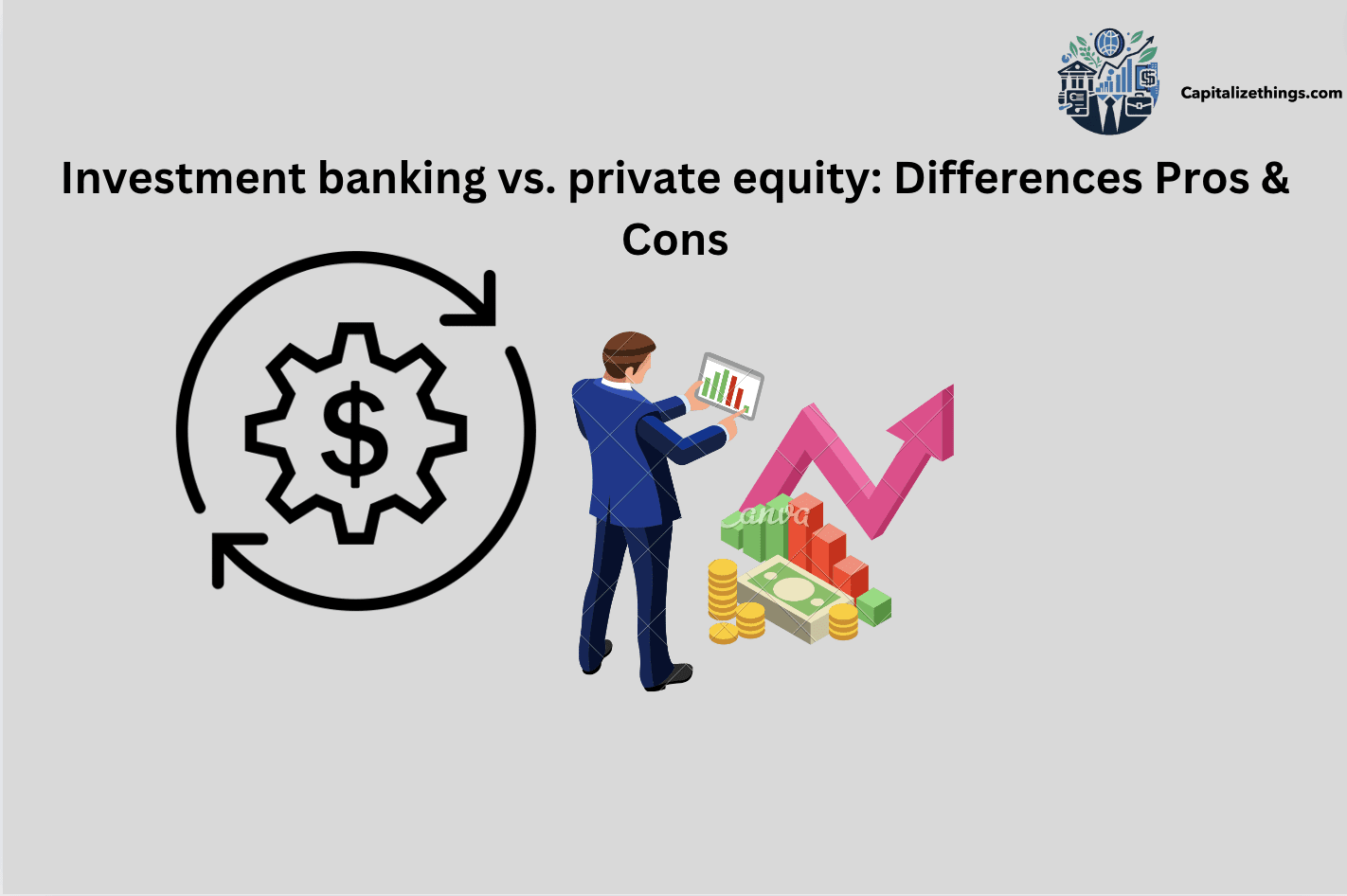Investment bankers provide advisory and financial services to clients regarding market share capital. Private equity firms aggregate cash from wealthy investors to buy holdings in diverse companies. Take A to be a private equity firm. Business B is Investment banking. Most individuals unfamiliar with this topic would compare the two, yet they are different. Firm A is a group of recognized company investors. How would they proceed? They would invest lump-sum assets from pension funds, insurance firms, and affluent individuals in enterprises they thought would yield a higher return.
Firm B differs entirely. Businesses use Firm B to raise money. Firm B helps clients with asset allocation, mergers and acquisitions, restructuring, and capital-raising. What distinguishes firms A and B in their industries? Firm A invests, whereas firm B raises funds. Private equity differs significantly from investment banking. No risky investments are required in investment banking. Investment bankers assist and consult. In a private equity company, you invest, not advice. The investment banker must sell concepts to convince the customer to do the deal, yet these are distinct sectors and paths, though they often interact. Many advantages and disadvantages exist for both terms. Discuss them here to decide what to keep and what to discard.
Investment banking provides you with more significant opportunities and makes you a business hub everywhere. It demonstrates the value of hard effort and how one concentration generate tremendous rewards. You get good money. You will receive a large bonus and a salary few can earn in two to three years. Its major drawback is that an investment banking job requires courage. Work at least 16 hours, including weekends. There would be no equilibrium between work and life, and your health could suffer if you don’t stay sane. If you want to help firms succeed, join a private equity team. It looks straightforward, but you must understand more than an investment banker to be a private equity associate. Being a private equity associate has a few drawbacks. You only need to know more when you construct models to go deep as a buyer.
What is investment banking?
Investment banking helps organizations and individuals generate funds and provide financial consulting. It connects security investors and issuers and helps startups go public. Investment banks either buy all available shares at an expert-estimated price and resale them to the public or buy shares for the issuer and receive a commission. Investment banking is one of the most tough financial mechanisms. It serves numerous businesses and purposes. These banks offer proprietary trading, purchase and sale advisory, leveraged finance, restructuring, and fresh offerings or IPOs.
Investment banking covers open-market financial intermediation. Today, it refers to risk-based activity in all banks, but it was once used to distinguish banks that issued loans and collected deposits from those that traded securities in the US and Japan. This article discusses reputational capital in investment banking and contrasts successful investment banks’ transactional abilities and creativity with worries about their societal value during the 2007-09 global crisis (Investment Banks, P. Lejot, 2012).
What is private equity?
In private equity, investment partnerships buy and operate firms before selling them. Private equity firms manage these funds for institutional and accredited investors. They can purchase public or private firms alone or in a consortium. They rarely own stock in public corporations. Alternative investments include venture capital, private equity, and hedge funds. This asset class is only available to high-net-worth institutions and individuals since investors must commit significant resources over the years.
Most private equity funds invest in established firms, unlike venture capital. They run their portfolio firms to increase or extract value before quitting years later. The private equity business has risen significantly due to more significant alternative investment allocations and good fund returns since 2000. In 2022, private equity buyouts reached $654 billion, second-best ever. Private equity investing is more profitable and famous when stock markets are elevated, and interest rates are low. Private equity companies raise client cash to form private equity funds and manage them as general partners for fees and a portion of earnings beyond the hurdle rate.
What is the difference between investment banking and private equity?
Finance includes both private equity and investment banking. Investment banks broker and sell securities, whereas private equity manages investments. The following table describes the difference between investment banking and private equity.
| Investment banking | Private Equity |
|---|---|
| Investment banks advise businesses, governments, and others on M&A, capital raising (stocks or bonds), reorganization, and other financial services. | Private equity firms buy private enterprises or privatize public ones. Institutional investors and wealthy people fund their company ownership shares. |
| Investment banks facilitate capital market securities trading. They insure and distribute new securities, bonds, trade shares, and other financial instruments for clients or banks. | Private equity firms usually own a significant share in the companies they invest in and actively manage and improve them. |
| Any investment bank can trade, hedge, and offer risk management solutions to clients to reduce financial risks. | Private equity firms make investments in portfolio companies for 3-7 years to enhance their performance before exiting for a return. |
Seniority, company size, geography, and performance affect private equity and investment bank compensation. Both fields pay well, but their structures differ. Investment banking offers basic wages and large bonuses, especially for junior analysts and associates. Top-tier corporations often offer incentives that exceed base wages. The share of incentives alters, as individual’s rise to vice president, director, and managing director jobs, but overall remuneration stays high.
Private equity compensation includes basic salary and bonuses; however, the bonus system might vary. As private equity associates become more senior, they often receive carried interest or a percentage of investment earnings as part of their remuneration. Successful agreements and investment performance can yield benefits that exceed investment banking. While investment banking pay bigger upfront bonuses, private equity (and venture capital) often deliver higher long-term returns, especially at senior levels, due to accrued interest and profit-sharing agreements. However, both industries offer high salaries.
What is the salary difference between investment banking and private equity?
Private equity offers $275k to $390k at top firms. Investment banking offers $240,000 – $270,000 (first year), $275,000 – $390,000 (second year), and $320,000 – $450,000 (third year).
What is the difference between investment banking and private equity firms?
Private equity (PE) & venture capital invest in non-public assets. Private equity firms can engage with investment banks to leverage buyouts of publicly listed companies and acquire privately held enterprises from venture capital firms and other owners. Like real estate investors, private equity firms have different business interests. Private equity demands a controlling interest and improves operations, restructures, or changes strategy. Private equity seeks to boost investor returns by enhancing performance and company value. IPOs, PE sales, and strategic buyer acquisitions affect fund performance.
Investment banking provides underwriting (capital raising) and M&A advising services to corporations, governments, and organizations. It connects investors with enterprises that need finance to expand and operate. Investment banks are appropriate sell-side partners to private equity firms on financial transactions, either connecting them with investors or raising funds in capital markets.
What are the pros and cons of investment banking and private equity?
Private Equity Pros and Cons:
Private equity offers high wages and business collaboration. Financial analysis, negotiating, and management abilities can also be learned. However, private equity professionals have extended hours, stress, and poor work-life balance. Private equity is extremely competitive, which is another drawback. Entering the profession is difficult due to a lack of employment openings and a vast pool of competent people. Due to the tough job, private equity firms have a high turnover rate and high expectations for their personnel.
Investment Banking Pros and Cons:
Investment banking pays well and lets you collaborate with finance executives. It increases transactional work, financial analysis, and pressure-handling experience. Long and unpredictable hours might lead to a lack of balance between professional life and personal time. Another benefit of investment banking is rapid job advancement. Investment banks usually have a hierarchy and grant performance-based promotions. This can accelerate job advancement and allow for greater responsibility and higher-level initiatives.
The competitive nature of investment banking can create a stressful workplace. The stress of meeting deadlines and exceeding expectations can tire you intellectually and emotionally. People with homes or other obligations find the job’s extensive travel difficult.
Can you move from investment banking to private equity?
Yes! You can move from investment banking to private equity. Any successful career move begins with identifying your motivation. Investment banking to private equity are motivated by financial gain or investment process control. To succeed in your new field, you must understand why you are making this shift.
Understanding the difference in work culture between investment banking and private equity is crucial. Investment banking is known for hard hours and intense pressure, while private equity is more casual and collaborative. It would help if you considered whether this work culture change suits your personality and style.
Another factor is the skills needed for this transformation. Investment banking emphasizes modeling and financial analysis, whereas private equity involves strategic thinking, negotiating, and connection building. To succeed in your new work, you should evaluate your skills and identify any shortcomings.
How hard is it to get into private equity from investment banking?
Your chances from getting into private equity from investment banking are low in these fields. Private equity firms mostly hire Investment Banking Professionals at bulge bracket and boutique banks and some in-Between Banks.
Does private equity pay better than investment banking?
Both private equity and investment banking are highly paid fields.
How many years of investment banking before private equity?
Firms prefer individuals with at least 2 years of investment banking researcher experience.
What is the difference between a hedge fund and an investment bank?
The difference between a hedge fund and an investment bank is that Hedge funds are portfolio investments. The fund’s portfolio generates returns from its many assets. Outside investors can acquire shares in this portfolio like they would a mutual fund or ETF, and they profit based on their proportional ownership. A hedge fund makes money from fees and portfolio growth. One way is fees. Hedge funds charge investors to invest in the portfolio to cover the cost of actively managing it. The firm usually charges a set fee (2% of your holdings per year) and a percentage of returns.
Whereas investment banks help corporations and clients manage substantial financial transactions, unlike ordinary banks. Morgan Stanley and Goldman Sachs are famous investment banks. Investment banks serve large firms and brokerages. They occasionally work with wealthy individuals, but only when enormous quantities of capital are involved. Investment banks don’t hold money for individuals, such as checking or savings accounts. The bank makes funds by charging fees and commissions to clients who exchange financial goods. Investment banks were prohibited from serving as depository banks for non-accredited persons for most of the 20th century. The law was primarily revoked in November 1999.
What is the difference between asset management and investment banking?
The difference between asset management and investment banking is that asset managers buy financial goods from investment bankers for their clients. Investment bankers sell investment products to asset managers, who buy them for their clients. Investment banking involves sales skills, whereas asset management demands analytical and quantitative skills. Most successful people in either field have a decent blend of both attributes. Investment managers can handle stocks, bonds, goods, and pricey metals like silver and gold. In addition to HNWI portfolios, asset managers handle hedge funds, pension plans, and pooled structures like index funds, mutual funds, and ETFs in a single portfolio to serve smaller investors effectively.
What is the difference between corporate banking and investment banking?
The difference between corporate banking and investment banking is that companies can use investment and corporate banking, both are financial services. Many banks provide investment banking and corporate banking services to the same clients. However, there are essential variances. Corporate banks have long-term relationships with clients, while investment banks are transactional.
Corporations receive loans and permanent lines of credit from corporate banks. Companies might use loans for specific projects or revolving lines of credit for continuing liquidity. Companies need several financial services under the umbrella of treasury management. These services involve liquidity management, reporting, accounts payable online banking, receivable management, fraud protection, and more. These services help businesses stay financially healthy and run smoothly. Businesses must manage interest rate and equity risk to minimize financial losses. Business bankers help organizations hedge against numerous losses.
Helping companies raise stock is one of investment banks’ most essential services. They assist them in generating money by selling firm equity. They can get this through follow-on offerings, private placements and IPOs for private enterprises. Investment banks finance enterprises and governments with debt. They usually issue and underwrite company bonds. Investors lend capital to the company by buying bonds—investment banks guarantee, price, and rate bonds for firms. Investment banks assist firms in finding target companies, valuing them, doing due diligence, and closing deals.
Conclusion:
If you are looking for a work-life balance, it is better to choose any other profession than investment banking. Only some people work 8 hours a day in investment banking. Investment banking is suitable if you can work from 9 AM to 2 AM most days. The job is stressful. People must work hard to get bargains. However, working 16-20 hours a day has two fundamental benefits. First, earning is unlimited. Thus, you can earn as much as you wish and receive bonuses and a salary for each deal. Second, you’ll always meet industry leaders. Knowing them can help you close more deals and become a business magnet. While addressing these two significant benefits, most people need to mention one of investment bankers’ main topics. This is friendship. Any investment banker will tell you that their best buddies are college classmates who cram all night to get a big deal. One of the advantages of this high-pressure work is that.
Unlike investment bankers, private equity partners live healthier. If things go well (they don’t usually), private equity associates work 8-12 hours a day. They typically spend weekends with family or hobbies. So, private equity associates have a better work-life balance than investment bankers. Weekend work is less than an investment banker’s. The team typically stays small (around 10-15), so you can talk to seniors. Every employee must work toward a common goal in the office’s cube environment. Due to their proximity to investing and taking action, private equity associates have a more substantial impact on sales and trading. Investment bankers have a more minor effect on corporate sales and trading. Private equity is less glamorous than investment banking.

Larry Frank is an accomplished financial analyst with over a decade of expertise in the finance sector. He holds a Master’s degree in Financial Economics from Johns Hopkins University and specializes in investment strategies, portfolio optimization, and market analytics. Renowned for his adept financial modeling and acute understanding of economic patterns, John provides invaluable insights to individual investors and corporations alike. His authoritative voice in financial publications underscores his status as a distinguished thought leader in the industry.









